► CAR grills Porsche chairman Oliver Blume
► The boss shaping the future of sports cars
► From hybrid 911s to e-fuels and hypercars
The head of Porsche, Oliver Blume, has confirmed a batch of further 911 derivatives – including a ‘very sporty hybrid’ and a range of off-road sports cars inspired by the Dakar – as well as a next-generation Porsche hypercar, as the company continues to innovate and hone its business model ready for the era of electrification.
Porsche recently topped CAR magazine’s 60th anniversary countdown of the most significant and successful car manufacturers of our first six decades (pictured above) and we sat down for an exclusive audience with Blume shortly afterwards at an event in the US.
In a wide-ranging interview, the chairman of the executive board revealed the company’s priorities as it navigates the transformation sweeping the industry, updated us on Porsche’s plan for rolling out synthetic e-fuels and explained how it was adapting its model portfolio to appeal to a younger, more cosmopolitan and environmentally responsible audience.
Oliver Blume interview: the chairman of Porsche’s executive board
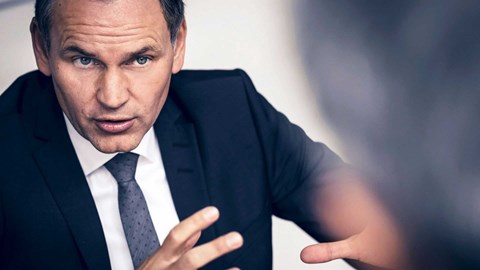
CAR: Congratulations on topping our 60th poll!
BLUME: ‘Thank you very much, we liked the articles. There is a lot of movement right now in Porsche, especially with the IPO and everybody is watching us, but it went very positively.’ [Porsche floated on the stock exchange on 29 September 2022].
Can we start by talking about the business performance in 2022. How is Porsche doing?
‘We are still in difficult market conditions, that is clear. At the beginning of the year we had the coronavirus shutdowns in China, the Ukrainian war, semiconductor shortages and supply chain issues. However, we have demonstrated a strong performance during the Covid years and the semiconductor problems. The Porsche business model is about having a strong financial base, being flexible in terms of volume around the world in the different regions and we are therefore in very strong business conditions this year – it is very convincing for our investors… It shows that Porsche is in good shape for the years to come.’
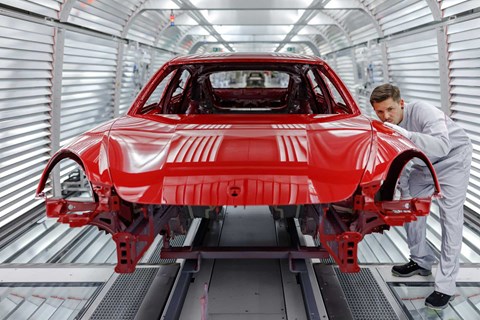
Despite tough trading conditions, Porsche deliveries were up 2 percent year-on-year in the first three quarters of 2022. Will sales remain on an upward trajectory?
‘For us, volume isn’t our focus and hasn’t been our focus – and nor will it be our focus in the future. We are more focused and intent on fulfilling dreams for costumers, offering special cars, exclusive cars like the 911 Dakar that we presented in LA. This is our aim, to win our customers over, to convince them to buy Porsche and then having a positive mix and having a positive profitability. That is what counts. So, volume isn’t a priority. This year [2022], we will come up to more or less the same volume level as last year [2021], because of all the circumstances with supply chains, war and so on. But looking to our financial results, they are as strong as ever before.’
Tell us about the decision-making process that begat the 911 Dakar. Did your research data suggest that Porsche customers want something like this, or was it just an inspired Eureka moment?
‘Everything we do is about listening to our customers. We have customers in different regions around the world. There was a need to bring a car you can drive off-road and, thinking of our product strategy, we have the 911 base, stretching from the entry model to the Turbo S. Then we have the very sporty ones, the GT models. We also have the heritage pillar – and there the idea came from the sports industry. We saw the sports shoes from the 1970s and 80s and thought that could work for Porsche too, so we brought the 50th edition and the 60th edition with the Sport Classic. We are considering bringing 1970s and 80s-inspired models too…
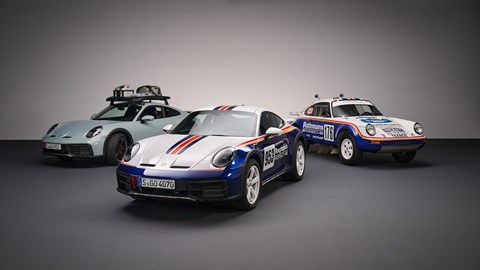
‘Very few global brands are able to bring these successful items from the past and connect them with modern technology. But Porsche can. Then we thought “Why not a third pillar, besides sporty GT and heritage models? Why not off-road, too?” When we were thinking about how to position the product and asking would it be feasible from a technical perspective, it was a stunning process over the past few years. But testing the prototypes, I was so convinced – it had such a good off-road ability. That was the clear point when I decided to go for it. The GT models like the GT2 RS are very focused on motorsport; they are very convincing with their Nordschleife times. The heritage models have a big product content. And now the 911 Dakar has a very high technical level.’
You describe it as a pillar, which sounds to us like there could be more to come. The 911 Dakar is a one-off with just 2500 cars – so could there be other supporting parts of that off-road-biased pillar?
‘Yes. We think so. Like in the heritage versions, we will start with limited editions. Now we will see how the market success of the Dakar pans out. And then maybe there will be more to come. The door is now open…’
More off-road Porsche 911s are coming
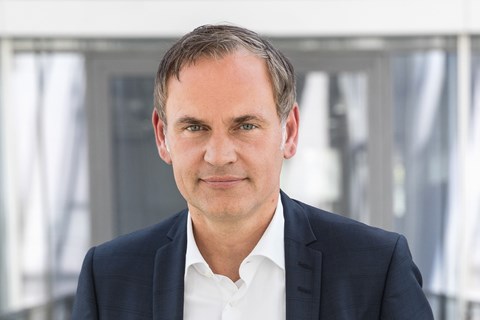
There are some big Porsche anniversaries in 2023…
‘Next year we will celebrate 60 years of the 911, 75 years of our company and the 80th birthday of Wolfgang Porsche.’
Can we therefore expect some model news around these anniversaries?
‘Of course, you can expect them!’
The 911 remains the heartland of Porsche. But you are also moving into electrification with the Taycan family and the upcoming Macan. Will the two strands meet? What is the update on the two core parts of your business coming together?
‘Let me start with our product strategy and philosophy. We have a very clear view on the different drivetrains and how to drive Porsche through the transformation. Our aim is to offer in each of our segments – the two-door sports cars, the four-door limousines and the SUVs – a combustion engine version, a hybrid version and a fully electric version. Coming back to the two-door sports cars, we will add a very sporty hybridisation to the 911, so then we will have the offer of combustion engines and hybrid in the 911 and we already announced we will come with a fully electric 718. In our SUVs, we will have the Cayenne with combustion engines, a plug-in hybrid with electric ranges over 80km [50 miles] and then a fully electric Macan. So, we have a clear strategy driving the ramp-up of electrification during the next few years, with the goal of delivering over 80 percent fully electric by 2030. It is a very strong ramp-up curve.’
Electric Porsches: the lowdown
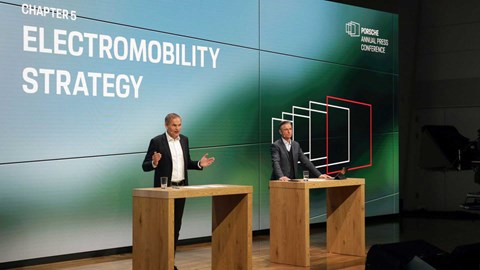
So the end of the decade is the horizon for majority EV models?
‘Correct. It’s by the end of the decade, but we are running ahead of our plans. Last year we were able to sell 40 percent electrified cars in Europe and 25 percent worldwide. The majority of those are [full BEV] electric and we have a very clear cycle plan behind how to manage it. Talking about the 911, it will be the model which we will drive as long as we can with a combustion engine.’
What is your take on the upcoming EU7 rules? Is tighter legislation changing the speed with which you think you need to move?
‘I think what will be important to the discussions around EU7 is that the testing conditions must be realistic. For me, it doesn’t make any sense to define testing conditions which are not realistic. For example, climbing up a hill in first gear with a horsebox behind, that doesn’t make any sense for Porsche. It has to be leveraged. All the rest, the limits of CO2 and NOx – that’s okay, but testing plays a big role and I hope that they have a realistic perspective on that.’
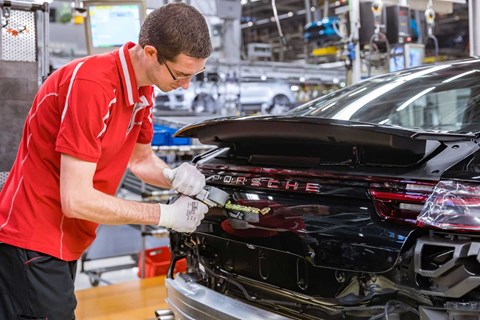
Is that the next step of negotiations with the EU?
‘My hope is that they come with a realistic approach – as for the rest, we will fulfil the regulations. With our mix of engines, we are well prepared for the transformation.’
What’s the update on synthetic e-fuels? You have invested a lot of money in the Chile factory. Is this about servicing the existing car park, because 70 percent of Porsches ever built are still on the road? Or could synthetic fuels be part of the mix for combustion engines living on in new cars in future?
‘I would come from a different perspective. As you know, sustainability plays a big role for us. In a lot of rankings Porsche is positioned as the highest automotive company worldwide for sustainability and climate protection. It is a big responsibility, perhaps the biggest we have, for our generation and the future generations. Sometimes there is perceived to be a conflict between electromobility and synthetic fuels. But there isn’t a conflict for us – we have a very strong ramp-up curve for electromobility, while on the other side we think about the cars already existing in the world. There are 1.3 billion cars already out there. That is a strong, crazy number and we will have these cars on the road for the next 30 or 50 years in the market. This is not a discussion to stop the homologation of combustion engines cars in 2035. We will have all these cars still existing on our roads and we need a solution. And it’s not only the cars, but also for ships and aeroplanes.
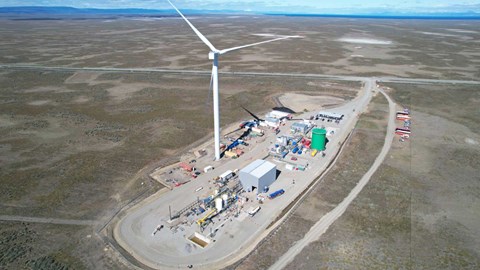
‘Therefore, we think there’s a responsibility to invest in synthetic fuels and produce them in regions in the world where sustainability is unlimited [like the pilot factory in Chile, above], then the discussion of efficiency doesn’t play a role. That is why we are fighting for synthetic fuels. Clearly, it will help the Porsche fleet for the future, and we are thinking only to mix a percentage of synthetic fuels with traditional combustion fuels. By 2040 or 2050 it will help to reduce our CO2 from a global perspective.’
What is the latest timeframe to productionise synthetic fuel? What is the target date?
‘No, we haven’t given one, because different regions of the world are doing the transformation at different speeds. We have the European perspective, the Chinese perspective, the Asia Pacific, and North American perspectives and therefore we will match [each region’s needs]. We will be prepared for all scenarios, but we will decide on when it is necessary to decide. This flexibility we have built over the last few years: we have already invested in production plants, in engineering and so we can leverage it, depending when the regions will move.’
You describe the Porsche model portfolio as sports cars, limousines and SUVs. Is that how you define modern Porsche?
‘We have two-door sports cars, limousines and SUVs. Those are our three ranges.’
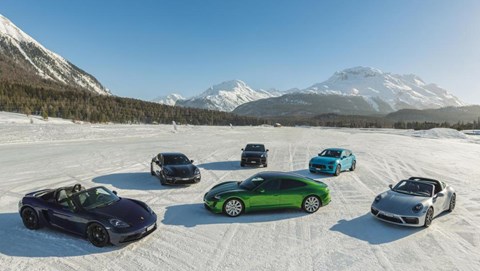
What is the long-term outlook for the mix between each? Will the percentages stay similar, as new families arrive and electrification takes hold? We’re keen to understand your vision for how the company will be structured in the future.
‘There are two main aspects. Everything that we do should be a sports car. We talk about an SUV or two-door sports cars. All of them have the genes of a sports car. And secondly everything that we do should be 100 percent Porsche. This describes the success of the Taycan. When we started the Taycan project, we had our own goal: it was going to be 100 percent electric and 100 percent Porsche in look and feel, and how you drive it – and that is what has driven the success of it, which is now paying off. And so in the future we will stick to our guns, bringing new sports cars, surprising new cars like the 911 Dakar, while expanding our model range maybe with a very luxurious SUV. And everything we do, whether it is a two-door sports car or SUV is thought from the customer perspective.’
Customers are changing. Is this why we are seeing new products like the 911 Dakar and the 911 or Taycan with a roof tent? It looks like a deliberate move to us, making more outdoorsy models… it’s not coincidence, is it? You’re pushing into new areas of the market place, adapting to how people are living their lives nowadays, aren’t you?
‘Yes, this is what we are doing. First of all, the needs of the different regions of the world are changing: we have different ecosystems in the Eastern world, for example. So we are changing our business focus and offering to our customers what they expect in different regions of the world. And the mindset of customers is also changing, especially looking to the younger generations.
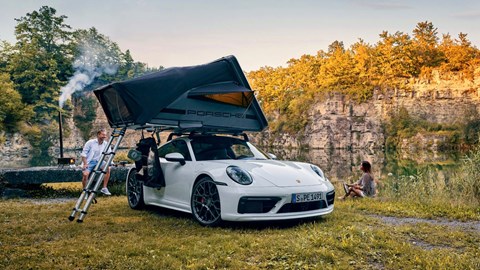
‘With our Taycan customers, over 60 percent are new to the brand. That is a big advantage for Porsche – being able to stay with our traditional costumers, whilst also being able to win new customers. Listening to them, they tell us: “Five years ago, I would never have considered buying a Porsche because they didn’t fit with my mindset. But today, because of your positioning of sustainability and taking responsibility, having this very strong views on ESG [environmental, social and governance] and investing heavily in social projects, that’s my mindset and I want to buy a product from a company that takes their responsibility and fits to my own life”.’
It’s been a while since Porsche did a proper hypercar like the 918. You’ve done them once a decade or so in the past – are they still in the product plan? What role does a car like that play in modern Porsche?
‘Porsche was always successful with this kind of hypercar, showing what is possible, showing future technologies, cutting-edge products. We will bring a hypercar when it’s time to bring it. So hypercars will play a role for Porsche in the future. But it isn’t decided yet.’
With all your anniversaries next year, we shouldn’t expect one in 2023?
‘Of course. We have so many ideas, but for now we are concentrating on electromobility. We have so many products in the next few years and then we will leverage when will be the right moment to bring it – when we want to show cutting-edge technology. But the hypercar is always a part of Porsche’s strategy.’
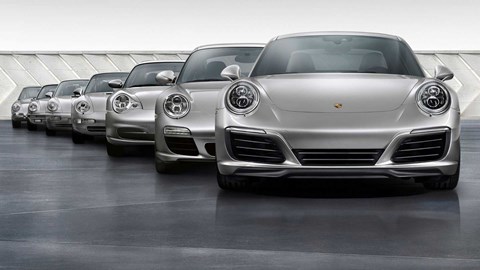
It is fascinating to look at the 911 configurator today – it’s a sprawling page with 26 different models available. This goes against the industry trend to streamline choice and reduce complexity in model ranges. How do you do it?
‘We are going totally in the opposite direction, offering more exclusivity and more individualisation. We think in the segment we are playing in – the sporty, modern luxury segment – it is the need of our customers. It is what everybody wants. Starting with the colours, we are offering 160 different paint colours, I don’t know any other car company in the world which is able to offer this number of colours. Soon you will be able to create your own colour with your name which will be an exclusive colour created once only, worldwide. We think on the one hand this is fulfilling dreams for customers, and on the other side there is a good business behind it. This is the kind of car company that we are – still very close to our customers and offering them exclusivity.’
What is the typical spend on Porsche options?
‘It is over 20 percent. It depends on the model, clearly the 911 is the leading one, but there is a big need for individualisation on other models too. We have fantastic ideas, especially when it comes to electrified cars, so we will look very much forward to all of these ideas – and also surprising extras like the rooftop tent that we are offering on the 911 and Dakar, where two people can sleep very comfortably. We can offer them so many opportunities. It is very motivating, working on this project and thinking what could we offer.’
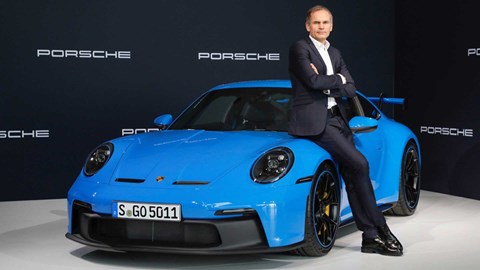
Do you see Porsche as a luxury brand, or a sporting brand?
‘Externally, we don’t talk about luxury. Because at Porsche we are positioned by price in the luxury segment, but for us it is more important that this is normal – we do not pronounce everyday that we are in the luxury segment. We have a unique positioning of Porsche: on the one hand we are able to get an average sales revenue over €100,000 [£88,000] per car worldwide – and that is comparable to all the niche manufacturers in the segment. Then on the other side, we have the opportunity of scale effects. With about 300,000 units a year, our model ranges benefit from Volkswagen Group components, their technology, purchasing volumes and ability to bundle the plants of the Volkswagen group. We have unique positioning and I do not know any other car manufacturer in the world who has this opportunity, this high pricing level and the scale.’
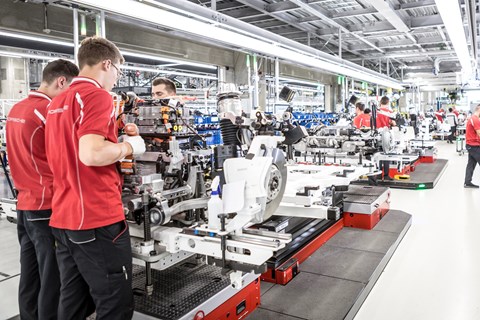
How is Porsche’s role changing within the VW group? You now have the likes of Rimac coming in and you sit alongside Bentley, Lamborghini and Bugatti…
‘We have driven the transformation very strongly in the past few years – and therefore Porsche has had very strong results. With the IPO we have positive feedback from outside investors and now Porsche is a completely autonomous company, separate from the VW Group while still being in conditions that benefit from scale effects in both directions. So Porsche is offering modules to the VW Group: we produce a platform for the Bentley Continental, for example, and we produce all eight-cylinder engines for the VW Group and for Lamborghini.
‘Then on the other side, we are benefitting from modules from the VW Group and so Porsche has a very special role within Volkswagen. We are at the forefront of high technology with very strong results. And so for me in my new double role [as chair of Porsche AG and the Volkswagen Group], we can benefit a lot. What I have learned at Porsche, what we have developed at Porsche, and now combining it with my strategic role in the VW Group, we can combine the best of two worlds.’
What role does motorsport play at Porsche? You have a long pedigree and history on track, is that going to change as electrification sweeps in?
‘Our full concentration currently lies on the Le Mans Daytona hybrid prototypes where we will come next year [in 2023 with the 963, below] for the big classic races worldwide: Le Mans, Daytona and Sebring, for example. We want to be able to win with this kind of product, we want very strong competition, that is what we like. That is our full concentration at the moment.
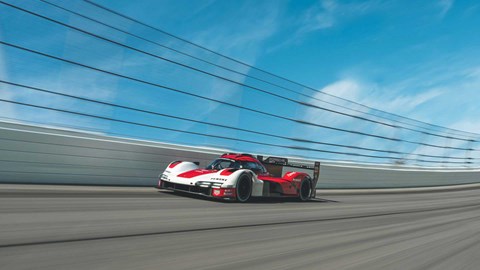
‘Looking to F1, because of the changes in regulations it might be interesting for Porsche, using synthetic fuel, having a higher level of electrificiation, having a cost cut… that becomes interesting. We are watching if there are opportunities. As you know, we have been checking together with Red Bull if there are opportunities to get in and for Porsche it is very important to not only be an engine supplier, we need a certain share of a race team. In the end, we stopped discussions because Red Bull wanted to continue on their own. That is normal and I accept it totally, but if there are future opportunities, we haven’t decided yet. We haven’t any activities right now, but I won’t exclude it in future. Motorsport is core for Porsche, will be the core for Porsche and motorsport is continuously developing. Our concentration right now is on Le Mans Daytona – we will see what the future brings.’
And any Formula One decision would be after 2026, is that correct?
‘Yes. It is a maybe, but nothing has been discussed at this moment.’
Check out more CAR industry news here